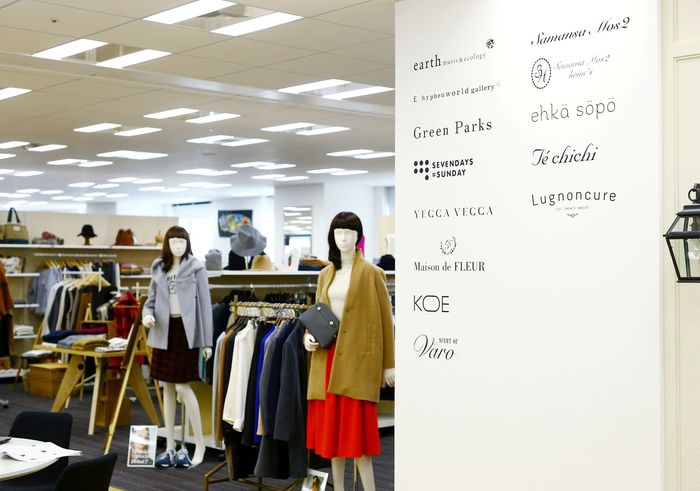
A Japanese apparel retailer, Cross Company, is slated to succeed the industry giant, Uniqlo. Unlike its rivals, it is racking up profits with its fast turnover of limited stock in a growing chain of small stores.
While most companies using the specialty store retailer of private label apparel (SPA) business model replenish their stock roughly every 70 days, this company’s main label, Earth, Music & Ecology, does so in half the time or 26 days.
Key to its success is rigorous volume control. After three weeks, if less than 30% of the initial stock of a product has been sold, its price is slashed from the listed one to the next price category. After six weeks, it descends to yet another price category. In other words, progressive price cuts occur in the early stages.
Once a key product has been carefully developed based on nous and sales data, the company doesn’t hesitate to throw all its resources--people, stuff, money--at it. The consensus in the industry is that Earth, Music & Ecology “succeeds in clearing almost 100% of its stock.”
Merchandising for a 20-year span
Consumer awareness of Earth, Music & Ecology as a "cute" brand has been growing, especially among young women from their teens to their early 20s. Many regard it as “the first brand girls go for when they start high school or college.”

Still it’s been already 15 years since the brand started and its devotees have aged too. To keep its fan base, the company has incorporated seven smaller labels within the Earth, Music & Ecology brand. By doing so, it can provide goods for consumers ranging in age from their teens to their 40s while maintaining the goods under the Earth, Music & Ecology umbrella.
The brand is characterized by shorter hemlines and brighter colors for teenagers and artful designs to disguise the bodily flaws of women in their 40s.
“That’s our merchandising strategy: Keeping customers for 20 years as they age. It’s a business model our competitors lack,” Yasuharu Ishikawa, the founder of Cross Company, said.
Uniqlo’s founder, Tadashi Yanai, frequently summons Ishikawa to Fast Retailing headquarters. The meetings are always at 8 a.m., and Yanai doesn’t hold back from giving the younger man a piece of his mind.
“It’s about scale. Your stores are too small. Make them bigger,” he often chides Ishikawa.
Ishikawa, however, has other ideas. He has a clear target: cash-flow-based management with the fastest stock turnover in Japan.
“In just 20 years, this new company has expanded boldly and notched up sales of 100 billion yen without loans." said Ishikawa. "I’m proud of that--it has given me massive confidence. So I have problems with Yanai-san lecturing me about the importance of being large-scale.”
Yet it seems Yanai has huge respect for Ishikawa’s hiring policy. In the Japanese apparel industry, staff instability in the form of a revolving door of employees and many part-timers is a given. Cross Company, however, has defied that stereotype. Since the beginning, all its employees have been full-time.
“More employees tend to stay, and we have benefited from the accumulated know-how,” Ishikawa said.
Since February this year, the number of part-time staff at his company has been growing. Yet the full-timer rate of 87% of the work force is still high.
Uniqlo and Cross Company share a preference for the speedy turnover of stock and origins in provincial cities. Occasionally, they are the target of criticism on the Internet for being “exploitive.”
Catch up with the Yankees
Besides over 100 stores in China, Cross Company plans to expand in Europe and the United States with its new brand, KOE. With this, they have a spectrum of brands for a global strategy that will allow them to compete on a level playing field, not only with Uniqlo but also with other global brands, such as Zara and Gap.
Ishikawa has informed Yanai of these developments.
“We put a lot more into information technology than Uniqlo,” Ishikawa said. “Instead of product innovation like (Uniqlo’s) Heat-Tech, we are changing the very structure of product distribution. If productivity goes up, then even the waning apparel industry will turn a profit. You don’t necessarily have to have sales of 2 trillion yen to turn a net profit of 100 billion yen. With smart use of technology, it is possible to have a net profit of 100 billion yen, even with sales of 500 billion yen.”
“We plan to grow business by giving a total plan to customers in which we not only sell clothes but strengthen the supporting services by providing follow-up care. No different from providing maintenance for a car after you’ve sold it,” Ishikawa added.
A good example is the purchase of a dry-cleaning start-up that uses the latest technology to provide a data-based, bespoke service, complete with delivery and pickup.
Now, the company is ready to invest more on information technololgy, the global expansion and M&A. But to invest in all, "current cash flow is not enough," Ishikawa said. "We are staking everything on the next decade. Once floated on the Tokyo Stock Exchange, we would like to amass at least 20 billion yen."
“It took Uniqlo 50 years to reach its current stage. We’ve been around 22 years, so this is only the beginning. At the moment, the gap between us is like high school baseball vs. the Yankees. But we aim to be a company that can clash with them head-on in 20 years."
The article originally appeared in the September 12th issue of The Weekly Toyo Keizai.
